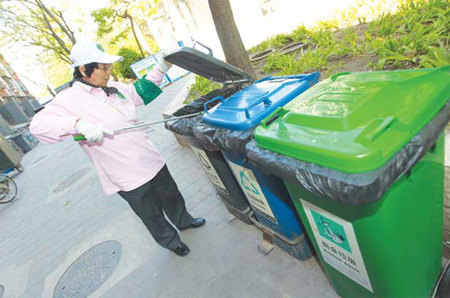A shining example out of mounds of waste
Updated: 2011-05-06 11:47
By Meng Jing (China Daily European Weekly)
About 1,200 residents in an old alley of Beijing practice garbage recycling on a daily basis
|
A volunteer checks how garbage is sorted in Dacheng Alley of Beijing. Cui Meng / China Daily |
What impressed Wang Tingyun most during her first trip to Australia in 1995 was not the beautiful countryside but the categorized garbage bins at the doors of every house.
"Most of us in Beijing had never heard about garbage sorting in the early 1990s, which is not something we are proud of," says Wang, a retired government employee.
In 1996, when Wang heard that a non-governmental organization was helping residential communities in Beijing sort out and recycle their garbage, the 68-year-old immediately signed her community up. Because of her efforts, Dacheng Alley became the first garbage-recycling pilot community in China.
Wang's decision has changed the way 400 families in the neighborhood have lived ever since. Around 90 percent of household garbage in Dacheng Alley is recycled, an increase from 20-percent sorting in 1996.
Most of the first-tier cities in China, such as Beijing, Shanghai and Guangzhou, have been pushing for its residents to recycle their garbage at the community level since 2000. But the 1,200 residents in Dacheng Alley are the few in China who practice recycling on a daily basis.
But forming a habit in the community was no easy task.
"Half of the residents here are well-educated retired teachers and they are supposed to know better about environmental protection. But still it was not an easy start," said Wang Shufen, who worked at the residential committee of Dacheng Alley when the recycling project kicked off in late 1996.
Wang Shufen says that most people did not understand that recycling garbage in a single residential community could help the garbage burden for the entire country. "It took us a year to let people know the importance of sorting garbage and convincing them to participate in the project," she says, adding that repeatedly holding meetings about recycling is key to the community.
The five people who work at Dacheng Alley's residential committee have made recycling a full-time job. They teach people about which garbage can be recycled through posters put up in the community and also through personal visits.
"We visit 20 to 30 families every year to help them sort garbage and offer them brochures on the project. Most people will sort garbage carefully after our visit," says Zhang Jingyuan, who has worked in the committee since 1998.
The community, with its 45 categorized garbage bins and 14 posters, is clearly not the most well-equipped residential community in Beijing to recycle, but thus far the community has done well in Beijing.
A survey by China Youth News in April showed that in 2004, only 20 percent of respondents in China recycled garbage, despite the fact that 90 percent of them said they supported the practice.
The practice of recycling garbage has recently taken on a more important role in China, which has overtaken the United States as the largest producer of household garbage since 2004. Around 60 percent of China's household garbage is kitchen waste, which is suitable for compost plants and reused as fertilizer, if properly sorted.
But only 2 percent of the household garbage in China was processed in compost plants in 2009, said Xie Xinyuan, municipal solid waste project coordinator with Friends of Nature. Xie says that most garbage in China is not sorted appropriately for compost heaps.
E-paper

Pearl paradise
Dreams of a 'crazy' man turned out to be a real pearler for city
Literary beacon
Venice of china
Up to the mark
Specials

Power of profit
Western companies can learn from management practices of firms in emerging economies

Foreign-friendly skies
About a year ago, 48-year-old Roy Weinberg gave up his job with US Airways, moved to Shanghai and became a captain for China's Spring Airlines.

Plows, tough guys and real men
在这个时代,怎样才"够男人"? On the character "Man"

